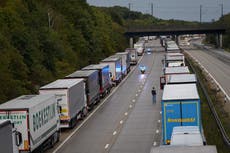There has been "genuine progress" in Brexit talks, but a no-deal is still possible, the president of the European Commission has said.
Addressing the European Parliament on Wednesday Ursula von der Leyen said the next few days "are going to be decisive".
Her comments come ahead of a return to face-to-face negotiations by the two teams following a period of isolation, after a member of the EU's delegation tested positive for Covid-19.
"The European Union is well prepared for a no-deal-scenario, but of course we prefer to have an agreement," she said.
"With very little time ahead of us, we will do all in our power to reach an agreement. We are ready to be creative. But we are not ready to put into question the integrity of our single market."
Ms von der leyden said negotiators had agreed the outline of a new partnership treaty on goods and services, as well as on transport, and that progress had been made on issues from judicial cooperation to coordinating welfare benefits.
But on key stumbling blocks like fishing quotas, settling future disputes, and harmonising regulations, the two sides are still far from agreement.
On these hardest issues, officials and diplomats have said long sad a political decision needs to be made in either Downing Street or Brussels, with one side or the other moving.
One EU official involved in talks said a deal was possible but not likely to come before the weekend.
On Tuesday Michael Gove, the cabinet office minister, said any move would have to come from Brussels.
A supposed mid-November deadline touted by both sides as necessary to get an agreement in place for the end of the year has now come and gone.
Nathalie Loiseau, close ally of Emmanel Macron who sits in the European Parliaments' liberal Renew group, said it was "actually impossible to say if there will be an agreement".
"In this uncertain context, there are at least two certainties: Even with an agreement, exchanges with the United Kingdom will be less fluid than before, and we must all be prepared for that," she said.
"Even without an agreement, there will certainly be a difficult moment, but negotiations will inevitably have to resume one day as our proximity is so great.
"This negotiation is difficult because it is aimed at limiting the damage, for us and for the British, of a decision that we did not take, the Brexit, and whose negative consequences many Britons had underestimated."
Chaos is expected at British ports whether or not a deal is signed, but a no-deal is expected to do more acute damage to the British economy.

Join our commenting forum
Join thought-provoking conversations, follow other Independent readers and see their replies
Comments